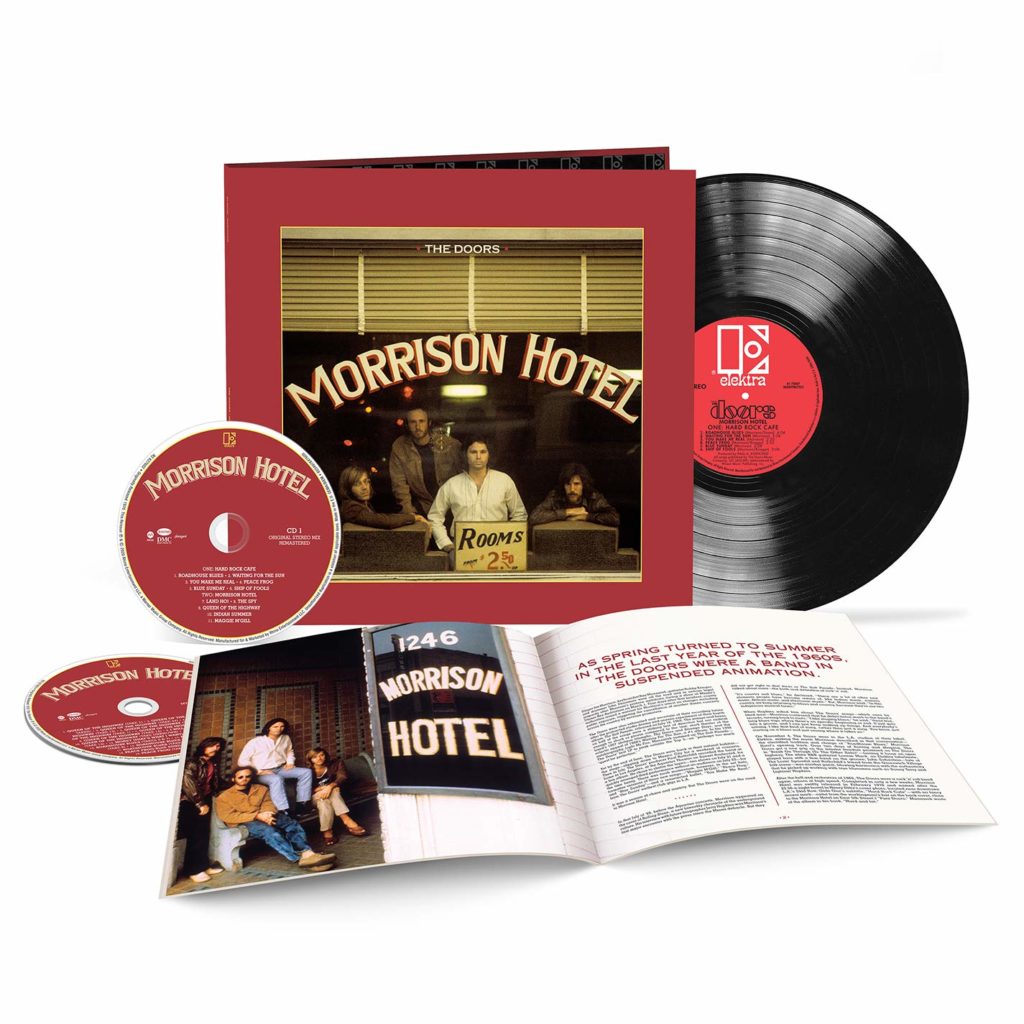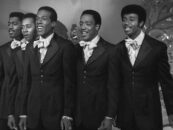The Doors’ penultimate studio album, 1970’s Morrison Hotel, arrived at a time of uncertainty for the group. Their previous LP, The Soft Parade, had proven a commercial success but had garnered lukewarm reviews because of relatively weak material and a plethora of string and horn arrangements. Adding to the sense that the band might be winding down were singer Jim Morrison’s legal troubles: his arrest shortly before The Soft Parade’s release, for allegedly exposing himself at a Miami concert, had led to cancellations of subsequent shows; and he had been arrested again during the recording of Morrison Hotel, this time for drunken behavior on an airplane.
Related: Our Album Rewind of The Soft Parade
 Though he was indeed on a downward spiral—and would die in July 1971, at age 27—he and the band still had a lot of life in them in late 1969 and January 1970, when they recorded the bluesy, Paul Rothchild–produced Morrison Hotel. The album finds them getting back to basics and delivering a strong batch of new performances that avoid The Soft Parade’s missteps while recalling their earlier strengths.
Though he was indeed on a downward spiral—and would die in July 1971, at age 27—he and the band still had a lot of life in them in late 1969 and January 1970, when they recorded the bluesy, Paul Rothchild–produced Morrison Hotel. The album finds them getting back to basics and delivering a strong batch of new performances that avoid The Soft Parade’s missteps while recalling their earlier strengths.
To this listener, Morrison Hotel isn’t quite as innovative—or as compelling—as the group’s earliest albums, but that doesn’t mean it isn’t good. “Roadhouse Blues,” where Morrison convincingly sings “woke up this morning and I got myself a beer,” is classic Doors, with fantastic guitar work by Robby Krieger (“Do it, Robby, do it!” Morrison yells as Krieger works his magic), lively piano by Ray Manzarek, solid drumming by John Densmore and harmonica by the Lovin’ Spoonful’s John Sebastian (credited as G. Puglese).
Listen to an outtake of “Roadhouse Blues”
Other highlights include the funky “Peace Frog,” which bemoans “blood in the streets in the town of Chicago,” an apparent reference to what happened at the 1968 Democratic Convention there; the impressionistic “Waiting for the Sun,” which sounds as if it could fit on Strange Days and has Morrison proclaiming that “this is the strangest life I’ve ever known”; “Queen of the Highway,” which showcases Manzarek’s innovative Rhodes piano work; and “Ship of Fools” and “Indian Summer,” both of which occasionally sound redolent of tracks on the group’s debut. The only scratch on the record is its closing number, the plodding “Maggie McGill.”
A new 50th anniversary numbered, limited-edition of Morrison Hotel offers a remaster of the original LP on both CD and 180-gram virgin vinyl. There’s also a 77-minute bonus disc that devotes 16 of its 19 tracks to work-in-progress versions of “Queen of the Highway,” “Roadhouse Blues” and “Peace Frog.”
Listen to an outtake of “Peace Frog”
Also featured are “I’ll Never Be Untrue,” a song that previously surfaced on Box Set and Essential Rarities; and covers of Muddy Waters’ “Rock Me Baby” and the Barrett Strong Motown hit “Money (That’s What I Want).”
These extras are all rough performances, permeated with false starts, sudden stops, failed experiments and random chatter, but that’s what should make them interesting, at least to serious fans.
Related: What are the other notable boxed sets and reissues of 2020?
Listening to these unedited snippets, you get a good sense of what the atmosphere was like in the studio with the Doors: fun, creative, and—thanks largely to Morrison, who at times sounds inebriated—more than a little bit wild.
Watch the Doors perform “Roadhouse Blues” live at the Isle of Wight festival in 1970







1 Comment so far
Jump into a conversationI don’t know how anyone could say that “Morrison Hotel isn’t quite as innovative—or as compelling—as the group’s earliest albums,” except maybe for the fact that strange factor that the Doors had going for them in their earliest days had worn off some by this time. The fact is that every single one of the Doors albums was unique and interesting it its own way, and any one of them could easily be anyone’s favorite. I get so tired of hearing writers lament about the shortcomings of “Soft Parade.” SP was a wonderful excursion for this band, where they stretched their wings and made a completely originally sounding record, that had some really timeless songs on it. Try to think of the Doors catalogue with SP missing, and you realize that it was not only a central part of their evolution, but it was also a musical place they went to that was totally Doors, and yet was different from anything they’d ever done or would do. There would be no way for the band to get “back to basics …..of their earlier strengths” and no return to form, as is often said of “Morrison Hotel” and “LA Woman” if there was no voyage away from them in the growth and change of SP. In this sense alone, I don’t see SP as qualifying as “missteps,” not to mention, I found the LP to be thrilling when it came out, and still see it as a Doors highlight. Some people just want a band to be one-dimensional, and, essentially, make the same records, or even one record, over and over. With the exception of SP, the Doors more or less did that with enough variations in each to make them each fascinating enough in their own right, and each one classics over the long haul. I, absolutely love all the songs on Morrison Hotel. I don’t see any need to compare it to other Doors LPs, or denigrate any of their others to say it is a better LP.